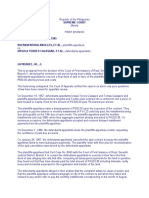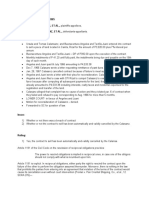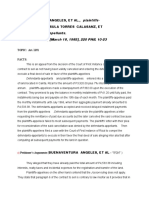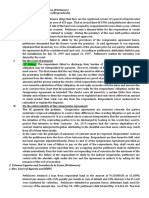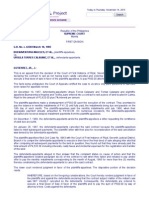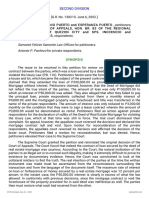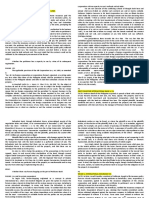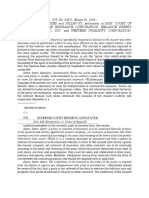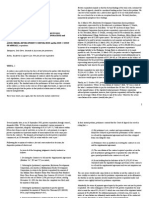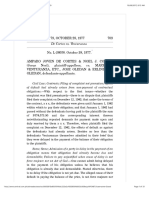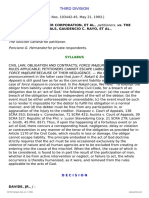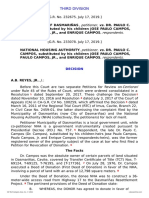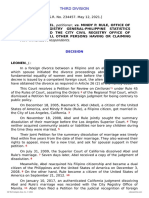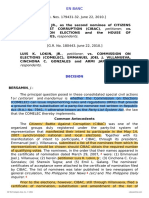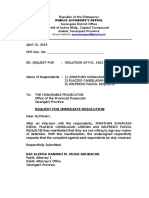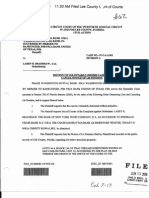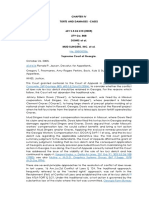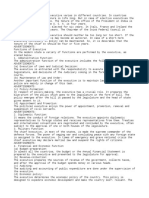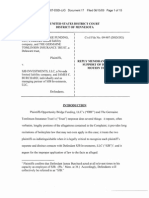15 Angeles v. Calazanz
15 Angeles v. Calazanz
Uploaded by
xylaCopyright:
Available Formats
15 Angeles v. Calazanz
15 Angeles v. Calazanz
Uploaded by
xylaCopyright
Available Formats
Share this document
Did you find this document useful?
Is this content inappropriate?
Copyright:
Available Formats
15 Angeles v. Calazanz
15 Angeles v. Calazanz
Uploaded by
xylaCopyright:
Available Formats
EN BANC
[G.R. No. L-42283. March 18, 1985.]
BUENAVENTURA ANGELES, ET AL., plaintiffs-appellees , vs.
URSULA TORRES CALASANZ, ET AL., defendants-appellants.
SYLLABUS
1. CIVIL LAW; OBLIGATIONS AND CONTRACTS; RECIPROCAL
OBLIGATIONS; RIGHT TO RESCIND; MAY BE EXERCISED EXTRA-JUDICIALLY. —
Article 1191 is explicit. In reciprocal obligations, either party has the right to
rescind the contract upon the failure of the other to perform the obligation
assumed thereunder. Moreover, there is nothing in the law that prohibits the
parties from entering into an agreement that violation of the terms of the
contract would cause its cancellation even without court intervention
(Froilan v. Pan Oriental Shipping, Co., et al., 12 SCRA 276) — "Well settled is,
however, the rule that a judicial action for the rescission of a contract is not
necessary where the contract provides that it may be revoked and cancelled
for violation of any of its terms and conditions' (Lopez v. Commissioner of
Customs, 37 SCRA 327, 334, and cases cited therein) . . . .
2. ID.; ID.; ID.; ID.; ID.; NOTICE, INDISPENSABLE. — The rule that it
is not always necessary for the injured party to resort to court for rescission
of the contract when the contract itself provides that it may be rescinded for
violation of its terms and conditions, was qualified by this Court in University
of the Philippines v. De los Angeles, (35 SCRA 102) where we explained that:
"Of course, it must be understood that the act of a party in treating a
contract as cancelled or resolved on account of infractions by the other
contracting party must be made known to the other and is always
provisional, being ever subject to scrutiny and review by the proper court. If
the other party denies that rescission is justified, it is free to resort to judicial
action in its own behalf, and bring the matter to court. Then, should the
court, after due hearing, decide that the resolution of the contract was not
warranted, the responsible party will be sentenced to damages; in the
contrary case, the resolution will be affirmed, and the consequent indemnity
awarded to the party prejudiced. . . .
3. ID.; ID.; ID.; ID.; NOT ABSOLUTE. — The right to rescind the
contract for non-performance of one of its stipulations, therefore, is not
absolute. In Universal Food Corp. v. Court of Appeals (33 SCRA 1) the Court
stated that — "The general rule is that rescission of a contract will not be
permitted for a slight or casual breach, but only for such substantial and
fundamental breach as would defeat the very object of the parties in making
the agreement. (Song Fo & Co. v. Hawaiian-Philippine Co., 47 Phil. 821, 827)
The question of whether a breach of a contract is substantial depends upon
the attendant circumstances. (Corpus v. Hon. Alikpala, et al., L-23707 & L-
23720, Jan. 17, 1968)." . . . .
CD Technologies Asia, Inc. © 2021 cdasiaonline.com
4. ID.; ID.; ID.; RESCISSION NOT PROPER WHERE THERE IS
SUBSTANTIAL PERFORMANCE OF OBLIGATION. — The breach of the contract
adverted to by the defendants-appellants is so slight and casual when we
consider that apart from the initial downpayment of P392.00 the plaintiffs-
appellees had already paid the monthly installments for a period of almost
nine (9) years. In other words, in only a short time, the entire obligation
would have been paid. Furthermore, although the principal obligation was
only P3,920.00 excluding the 7 percent interests, the plaintiffs-appellees had
already paid an aggregate amount of P4,533.38. To sanction the rescission
made by the defendants-appellants will work injustice to the plaintiffs-
appellees. (See J.M. Tuazon and Co., Inc. v. Javier, 31 SCRA 829) It would
unjustly enrich the defendants-appellants. Article 1234 of the Civil Code
which provides that: "If the obligation has been substantially performed in
good faith, the obligor may recover as though there had been a strict and
complete fulfillment, less damages suffered by the obligee."
5. ID.; ID.; ID.; RIGHT OF RESCISSION; ACCEPTANCE OF DELAYED
PAYMENTS OF INSTALLMENTS CONSTITUTES WAIVER AND ESTOPPEL. — The
defendants-appellants' contention is without merit. We agree with the
plaintiffs-appellees that when the defendants-appellants, instead of availing
of their alleged right to rescind, have accepted and received delayed
payments of installments, though the plaintiffs-appellees have been in
arrears beyond the grace period mentioned in paragraph 6 of the contract,
the defendants-appellants have waived and are now estopped from
exercising their alleged right of rescission.
6. ID.; ID.; CONTRACT TO SELL FALLS INTO THE CATEGORY OF A
CONTRACT OF ADHESION. — The contract to sell entered into by the parties
has some characteristics of a contract of adhesion. The defendants-
appellants drafted and prepared the contract. The plaintiffs-appellees, eager
to acquire a lot upon which they could build a home, affixed their signatures
and assented to the terms and conditions of the contract. They had no
opportunity to question nor change any of the terms of the agreement. It
was offered to them on a "take it or leave it" basis. In Sweet Lines, Inc. v.
Teves (83 SCRA 361).
7. ID.; ID.; ID.; CONSTRUED AGAINST ONE WHO CAUSED IT. — The
contract to sell, being a contract of adhesion, must be construed against the
party causing it. We agree with the observation of the plaintiffs-appellees to
the effect that "the terms of a contract must be interpreted against the party
who drafted the same, especially where such interpretation will help effect
justice to buyers who, after having invested a big amount of money, are now
sought to be deprived of the same thru the prayed application of a contract
clever in its phraseology, condemnable in its lopsidedness and injurious in its
effect which, in essence, and in its entirety is most unfair to the buyers."
DECISION
CD Technologies Asia, Inc. © 2021 cdasiaonline.com
GUTIERREZ, JR., J : p
This is an appeal from the decision of the Court of First Instance of
Rizal, Seventh Judicial District, Branch X, declaring the contract to sell as not
having been validly cancelled and ordering the defendants-appellants to
execute a final deed of sale in favor of the plaintiffs-appellees, to pay
P500.00 attorney's fees and costs. cdrep
The facts being undisputed, the Court of Appeals certified the case to
us since only pure questions of law have been raised for appellate review.
On December 19, 1957, defendants-appellants Ursula Torres Calasanz
and Tomas Calasanz and plaintiffs-appellees Buenaventura Angeles and
Teofila Juani entered into a contract to sell a piece of land located in Cainta,
Rizal for the amount of P3,920.00 plus 7% interest per annum.
The plaintiffs-appellees made a downpayment of P392.00 upon the
execution of the contract. They promised to pay the balance in monthly
installments of P41.20 until fully paid, the installments being due and
payable on the 19th day of each month. The plaintiffs-appellees paid the
monthly installments until July 1966, when their aggregate payment already
amounted to P4,533.38. On numerous occasions, the defendants-appellants
accepted and received delayed installment payments from the plaintiffs-
appellees.
On December 7, 1966, the defendants-appellants wrote the plaintiffs-
appellees a letter requesting the remittance of past due accounts.
On January 28, 1967, the defendants-appellants cancelled the said
contract because the plaintiffs-appellees failed to meet subsequent
payments. The plaintiffs' letter with their plea for reconsideration of the said
cancellation was denied by the defendants-appellants.
The plaintiffs-appellees filed Civil Case No. 8943 with the Court of First
Instance of Rizal, Seventh Judicial District, Branch X to compel the
defendants-appellants to execute in their favor the final deed of sale alleging
inter alia that after computing all subsequent payments for the land in
question, they found out that they have already paid the total amount of
P4,533.38 including interests, realty taxes and incidental expenses for the
registration and transfer of the land.
The defendants-appellants alleged in their answer that the complaint
states no cause of action and that the plaintiffs-appellees violated paragraph
six (6) of the contract to sell when they failed and refused to pay and/or offer
to pay the monthly installments corresponding to the month of August, 1966
for more than five (5) months, thereby constraining the defendants-
appellants to cancel the said contract. LLphil
The lower court rendered judgment in favor of the plaintiffs-appellees.
The dispositive portion of the decision reads:
"WHEREFORE, based on the foregoing considerations, the Court
hereby renders judgment in favor of the plaintiffs and against the
defendants declaring that the contract subject matter of the instant
CD Technologies Asia, Inc. © 2021 cdasiaonline.com
case was NOT VALIDLY cancelled by the defendants. Consequently, the
defendants are ordered to execute a final Deed of Sale in favor of the
plaintiffs and to pay the sum of P500.00 by way of attorney's fees.
Costs against the defendants."
A motion for reconsideration filed by the defendants-appellants was
denied.
As earlier stated, the then Court of Appeals certified the case to us
considering that the appeal involves pure questions of law.
The defendants-appellants assigned the following alleged errors of the
lower court:
First Assignment of Error
THE LOWER COURT ERRED IN NOT HOLDING THE CONTRACT
TO SELL (ANNEX "A" OF COMPLIANCE) AS HAVING BEEN LEGALLY
AND VALIDLY CANCELLED.
Second Assignment of Error
EVEN ASSUMING ARGUENDO THAT THE SAID CONTRACT TO
SELL HAS NOT BEEN LEGALLY AND VALIDLY CANCELLED, THE
LOWER COURT ERRED IN ORDERING DEFENDANTS TO EXECUTE A
FINAL DEED OF SALE IN FAVOR OF THE PLAINTIFF.
Third Assignment of Error
THE LOWER COURT ERRED IN ORDERING DEFENDANTS TO
PAY PLAINTIFFS THE SUM OF P500.00 AS ATTORNEY'S FEES.
The main issue to be resolved is whether or not the contract to sell has
been automatically and validly cancelled by the defendants-appellants.
The defendants-appellants submit that the contract was validly
cancelled pursuant to paragraph six of the contract which provides:
xxx xxx xxx
"SIXTH. — In case the party of the SECOND PART fails to satisfy
any monthly installments, or any other payments herein agreed upon,
he is granted a month of grace within which to make the retarded
payment, together with the one corresponding to the said month of
grace; it is understood, however, that should the month of grace herein
granted to the party of the SECOND PART expired; without the
payments corresponding to both months having been satisfied, an
interest of 10% per annum will be charged on the amounts he should
have paid; it is understood further, that should a period of 90 days
elapse, to begin from the expiration of the month of grace herein
mentioned, and the party of SECOND PART has not paid all the
amounts he should have paid with the corresponding interest up to
that date, the party of the FIRST PART has the right to declare this
contract cancelled and of no effect, and as consequence thereof, the
party of the FIRST PART may dispose of the parcel of land covered by
this contract in favor of other persons, as if this contract had never
been entered into. In case of such cancellation of the contract, all the
amounts paid in accordance with this agreement together with all the
CD Technologies Asia, Inc. © 2021 cdasiaonline.com
improvements made on the premises, shall be considered as rents paid
for the use and occupation of the above mentioned premises, and as
payment for the damages suffered by failure of the party of the
SECOND PART to fulfill his part of the agreement, and the party of the
SECOND PART hereby renounces all his right to demand or reclaim the
return of the same and obliges himself to peacefully vacate the
premises and deliver the same to the party of the FIRST PART." (Italics
supplied by appellant)
xxx xxx xxx
The defendants-appellants argue that the plaintiffs-appellees failed to
pay the August, 1966 installment despite demands for more than four (4)
months. The defendants-appellants point to Jocson v. Capitol Subdivision
(G.R. No. L-6573, February 28, 1955) where this Court upheld the right of the
subdivision owner to automatically cancel a contract to sell on the strength
of a provision or stipulation similar to paragraph 6 of the contract in this
case. The defendants-appellants also argue that even in the absence of the
aforequoted provision, they had the right to cancel the contract to sell under
Article 1191 of the Civil Code of the Philippines.
The plaintiffs-appellees on the other hand contend that the Jocson
ruling does not apply. They state that paragraph 6 of the contract to sell is
contrary to law insofar as it provides that in case of specified breaches of its
terms, the sellers have the right to declare the contract cancelled and of no
effect, because it granted the sellers an absolute and automatic right of
rescission.
Article 1191 of the Civil Code on the rescission of reciprocal obligations
provides:
"The power to rescind obligations is implied in reciprocal ones, in
case one of the obligors should not comply with what is incumbent
upon him.
"The injured party may choose between the fulfillment and the
rescission of the obligation, with the payment of damages in either
case. He may also seek rescission, even after he has chosen fulfillment,
if the later should become impossible."
xxx xxx xxx
Article 1191 is explicit. In reciprocal obligations, either party has the
right to rescind the contract upon the failure of the other to perform the
obligation assumed thereunder. Moreover, there is nothing in the law that
prohibits the parties from entering into an agreement that violation of the
terms of the contract would cause its cancellation even without court
intervention (Froilan v. Pan Oriental Shipping, Co., et al., 12 SCRA 276) —
"Well settled is, however, the rule that a judicial action for the
rescission of a contract is not necessary where the contract provides
that it may be revoked and cancelled for violation of any of its terms
and conditions' (Lopez v. Commissioner of Customs, 37 SCRA 327, 334,
and cases cited therein).
CD Technologies Asia, Inc. © 2021 cdasiaonline.com
"Resort to judicial action for rescission is obviously not
contemplated . . . The validity of the stipulation can not be seriously
disputed. It is in the nature of a facultative resolutory condition which
in many cases has been upheld by this Court. (Ponce Enrile v. Court of
Appeals, 29 SCRA 504)."
The rule that it is not always necessary for the injured party to resort to
court for rescission of the contract when the contract itself provides that it
may be rescinded for violation of its terms and conditions, was qualified by
this Court in University of the Philippines v. De los Angeles, (35 SCRA 102)
where we explained that:
"Of course, it must be understood that the act of a party in
treating a contract as cancelled or resolved on account of infractions
by the other contracting party must be made known to the other and is
always provisional, being ever subject to scrutiny and review by the
proper court. If the other party denies that rescission is justified, it is
free to resort to judicial action in its own behalf, and bring the matter
to court. Then, should the court, after due hearing, decide that the
resolution of the contract was not warranted, the responsible party will
be sentenced to damages; in the contrary case, the resolution will be
affirmed, and the consequent indemnity awarded to the party
prejudiced.
"In other words, the party who deems the contract violated many
consider it resolved or rescinded, and act accordingly, without previous
court action, but it proceeds at its own risk. For it is only the final
judgment of the corresponding court that will conclusively and finally
settle whether the action taken was or was not correct in law . . .
"We see no conflict between this ruling and the previous
jurisprudence of this Court invoked by respondent declaring that
judicial action is necessary for the resolution of a reciprocal obligation;
(Ocejo, Perez & Co. v. International Banking Corp., 37 Phil. 631;
Republic v. Hospital de San Juan de Dios, et al., 84 Phil. 820) since in
every case where the extrajudicial resolution is contested only the final
award of the court of competent jurisdiction can conclusively settle
whether the resolution was proper or not. It is in this sense that judicial
action will be necessary, as without it, the extrajudicial resolution will
remain contestable and subject to judicial invalidation, unless attack
thereon should become barred by acquiescence, estoppel or
prescription."
The right to rescind the contract for non-performance of one of its
stipulations, therefore, is not absolute. In Universal Food Corp. v. Court of
Appeals (33 SCRA 1) the Court stated that —
"The general rule is that rescission of a contract will not be
permitted for a slight or casual breach, but only for such substantial
and fundamental breach as would defeat the very object of the parties
in making the agreement. (Song Fo & Co. v. Hawaiian-Philippine Co., 47
Phil. 821, 827) The question of whether a breach of a contract is
substantial depends upon the attendant circumstances. (Corpus v.
Hon. Alikpala, et al., L-23707 & L-23720, Jan. 17, 1968)." . . .
CD Technologies Asia, Inc. © 2021 cdasiaonline.com
The defendants-appellants state that the plaintiffs-appellees violated
Section two of the contract to sell which provides:
"SECOND. — That in consideration of the agreement of sale of
the above described property, the party of the SECOND PART obligates
himself to pay to the party of the FIRST PART the Sum of THREE
THOUSAND NINE HUNDRED TWENTY ONLY (P3,920.00), Philippine
Currency, plus interest at the rate of 7% per annum, as follows:
"(a) The amount of THREE HUNDRED NINETY TWO only
(P392.00) when this contract is signed; and
"(b) The sum of FORTY ONE AND 20/100 ONLY (P41.20) on or
before the 19th day of each month, from this date until the total
payment of the price above stipulated, including interest."
because they failed to pay the August installment, despite demand, for more
than four (4) months.
The breach of the contract adverted to by the defendants-appellants is
so slight and casual when we consider that apart from the initial
downpayment of P392.00 the plaintiffs-appellees had already paid the
monthly installments for a period of almost nine (9) years. In other words, in
only a short time, the entire obligation would have been paid. Furthermore,
although the principal obligation was only P3,920.00 excluding the 7 percent
interests, the plaintiffs-appellees had already paid an aggregate amount of
P4,533.38. To sanction the rescission made by the defendants-appellants will
work injustice to the plaintiffs-appellees. (See J.M. Tuazon and Co., Inc. v.
Javier, 31 SCRA 829) It would unjustly enrich the defendants-appellants.
Article 1234 of the Civil Code which provides that: cdphil
"If the obligation has been substantially performed in good faith,
the obligor may recover as though there had been a strict and
complete fulfillment, less damages suffered by the obligee."
also militates against the unilateral act of the defendants-appellants in
cancelling the contract.
We agree with the observation of the lower court to the effect that:
"Although the primary object of selling subdivided lots is
business, yet, it cannot be denied that this subdivision is likewise
purposely done to afford those landless, low income group people of
realizing their dream of a little parcel of land which they can really call
their own."
The defendants-appellants cannot rely on paragraph 9 of the contract
which provides:
"NINTH. — That whatever consideration of the party of the FIRST
PART may concede to the party of the SECOND PART, as not exacting a
strict compliance with the conditions of paragraph 6 of this contract, as
well as any other condonation that the party of the FIRST PART may
give to the party of the SECOND PART with regards to the obligations of
the latter, should not be interpreted as a renunciation on the part of
CD Technologies Asia, Inc. © 2021 cdasiaonline.com
the party of the FIRST PART of any right granted it by this contract, in
case of default or non-compliance by the party of the SECOND PART."
The defendants-appellants argue that paragraph nine clearly allows the
seller to waive the observance of paragraph 6 not merely once, but for as
many times as he wishes.
The defendants-appellants' contention is without merit. We agree with
the plaintiffs-appellees that when the defendants-appellants, instead of
availing of their alleged right to rescind, have accepted and received
delayed payments of installments, though the plaintiffs-appellees have been
in arrears beyond the grace period mentioned in paragraph 6 of the contract,
the defendants-appellants have waived and are now estopped from
exercising their alleged right of rescission. In De Guzman v. Guieb (48 SCRA
68), we held that:
xxx xxx xxx
"But defendants do not deny that in spite of the long arrearages,
neither they nor their predecessor, Teodoro de Guzman, even took
steps to cancel the option or to eject the appellees from the home-lot
in question. On the contrary, it is admitted that the delayed payments
were received without protest or qualification. . . . Under these
circumstances, We cannot but agree with the lower court that at the
time appellees exercised their option, appellants had already forfeited
their right to invoke the above-quoted provision regarding the
nullifying effect of the non-payment of six months rentals by appellees
by their having accepted without qualification on July 21, 1964 the full
payment by appellees of all their arrearages."
The defendants-appellants contend in the second assignment of error
that the ledger of payments show a balance of P671.67 due from the
plaintiffs-appellees. They submit that while it is true that the total monthly
installments paid by the plaintiffs-appellees may have exceeded P3,920.00,
a substantial portion of the said payments were applied to the interests since
the contract specifically provides for a 7% interest per annum on the
remaining balance. The defendants-appellants rely on paragraph 2 of the
contract which provides:
"SECOND. — That in consideration of the agreement of sale of
the above described property, the party of the SECOND PART obligates
himself to pay to the party of the FIRST PART the Sum of THREE
THOUSAND NINE HUNDRED TWENTY ONLY (P3,920.00), Philippine
Currency, plus interest at the rate of 7% per annum . . . ." (Emphasis
supplied)
The plaintiffs-appellees on the other hand are firm in their submission
that since they have already paid the defendants-appellants a total sum of
P4,533.38, the defendants-appellants must now be compelled to execute the
final deed of sale pursuant to paragraph 12 of the contract which provides:
"TWELFTH. — That once the payment of the sum of P3,920.00,
the total price of the sale is completed, the party to the FIRST PART will
execute in favor of the party of the SECOND PART, the necessary deed
CD Technologies Asia, Inc. © 2021 cdasiaonline.com
or deeds to transfer to the latter the title of the parcel of land sold, free
from all liens and encumbrances other than those expressly provided
in this contract; it is understood, however, that all the expenses which
may be incurred in the said transfer of title shall be paid by the party of
the SECOND PART, as above stated."
Closely related to the second assignment of error is the submission of
the plaintiffs-appellees that the contract herein is a contract of adhesion.
We agree with the plaintiffs-appellees. The contract to sell entered into
by the parties has some characteristics of a contract of adhesion. The
defendants-appellants drafted and prepared the contract. The plaintiffs-
appellees, eager to acquire a lot upon which they could build a home, affixed
their signatures and assented to the terms and conditions of the contract.
They had no opportunity to question nor change any of the terms of the
agreement. It was offered to them on a "take it or leave it" basis. In Sweet
Lines, Inc. v. Teves (83 SCRA 361), we held that:
xxx xxx xxx
". . .' (W)hile generally, stipulations in a contract come about
after deliberate drafting by the parties thereto, .. there are certain
contracts almost all the provisions of which have been drafted only by
one party, usually a corporation. Such contracts are called contracts of
adhesion, because the only participation of the party is the signing of
his signature or his `adhesion' thereto. Insurance contracts, bills of
lading, contracts of sale of lots on the installment plan fall into this
category.' (Paras, Civil Code of the Philippines, Seventh ed., Vol. I, p.
80.)" (Emphasis supplied)
While it is true that paragraph 2 of the contract obligated the plaintiffs-
appellees to pay the defendants-appellants the sum of P3,920.00 plus 7%
interest per annum, it is likewise true that under paragraph 12 the seller is
obligated to transfer the title to the buyer upon payment of the P3,920.00
price sale.
The contract to sell, being a contract of adhesion, must be construed
against the party causing it. We agree with the observation of the plaintiffs-
appellees to the effect that "the terms of a contract must be interpreted
against the party who drafted the same, especially where such interpretation
will help effect justice to buyers who, after having invested a big amount of
money, are now sought to be deprived of the same thru the prayed
application of a contract clever in its phraseology, condemnable in its
lopsidedness and injurious in its effect which, in essence, and in its entirety
is most unfair to the buyers."
Thus, since the principal obligation under the contract is only
P3,920.00 and the plaintiffs-appellees have already paid an aggregate
amount of P4,533.38, the courts should only order the payment of the few
remaining installments but not uphold the cancellation of the contract. Upon
payment of the balance of P671.67 without any interest thereon, the
defendants-appellants must immediately execute the final deed of sale in
favor of the plaintiffs-appellees and execute the necessary transfer
CD Technologies Asia, Inc. © 2021 cdasiaonline.com
documents as provided in paragraph 12 of the contract. The attorney's fees
are justified. cdrep
WHEREFORE, the instant petition is DENIED for lack of merit. The
decision appealed from is AFFIRMED with the modification that the plaintiffs-
appellees should pay the balance of SIX HUNDRED SEVENTY ONE PESOS
AND SIXTY-SEVEN CENTAVOS (671.67) without any interests. Costs against
the defendants-appellants.
SO ORDERED.
Melencio-Herrera, Plana, Relova De la Fuente and Alampay, JJ., concur.
Teehankee, J., took no part.
CD Technologies Asia, Inc. © 2021 cdasiaonline.com
You might also like
- Henthorn V Fraser (1892) - 2-Ch.-27Document11 pagesHenthorn V Fraser (1892) - 2-Ch.-27nabila14No ratings yet
- Hadley Vs BaxendaleDocument4 pagesHadley Vs BaxendaleNehaNo ratings yet
- Angeles V Calasanz 135 SCRA 323Document14 pagesAngeles V Calasanz 135 SCRA 323Karren QuilangNo ratings yet
- Angeles Vs Calasanz 135 SCRA 323 (1985)Document2 pagesAngeles Vs Calasanz 135 SCRA 323 (1985)Benitez Gherold67% (3)
- Angeles v. CalasanzDocument14 pagesAngeles v. CalasanzisraelNo ratings yet
- Angeles, Et Al. vs. Ursula Calasanz, Et Al., G.R. No. L-42283, March 18, 1985Document13 pagesAngeles, Et Al. vs. Ursula Calasanz, Et Al., G.R. No. L-42283, March 18, 1985Lloyd Bryne LunzagaNo ratings yet
- Delta Motor Corporation v. GenuinoDocument7 pagesDelta Motor Corporation v. Genuinohumanresources.concernNo ratings yet
- Angeles Vs CalasanzDocument7 pagesAngeles Vs CalasanzXyrus BucaoNo ratings yet
- #1 Angeles vs. CalasanzDocument2 pages#1 Angeles vs. CalasanzErwin Bernardino67% (3)
- Plaintiffs-Appellees vs. Defendants-Appellants G.R. No. L-42283, (March 18, 1985), 220 PHIL 10-23Document4 pagesPlaintiffs-Appellees vs. Defendants-Appellants G.R. No. L-42283, (March 18, 1985), 220 PHIL 10-23KattNo ratings yet
- Buenaventura Angeles v. Ursula Torres CalasanzDocument2 pagesBuenaventura Angeles v. Ursula Torres CalasanzArjane Aram SamaniegoNo ratings yet
- Case Notes 2.0Document60 pagesCase Notes 2.0DaveKarlRamada-MaraonNo ratings yet
- Digest Nolasco v. Cuerpo GR No. 219215Document3 pagesDigest Nolasco v. Cuerpo GR No. 219215Rav EnNo ratings yet
- 0 Collated Case Digests 36 99Document45 pages0 Collated Case Digests 36 99maebeldelapenaNo ratings yet
- Angeles Vs CalasanzDocument2 pagesAngeles Vs CalasanzJay CezarNo ratings yet
- Petitioner vs. vs. Respondents R.C. Domingo Jr. & AssociatesDocument8 pagesPetitioner vs. vs. Respondents R.C. Domingo Jr. & AssociatesChristine Ang CaminadeNo ratings yet
- G.R. No. L-42283, Mar 18, 1985, Angeles v. Calasanz, 135 SCRA 323 - ObliCon-CDDocument3 pagesG.R. No. L-42283, Mar 18, 1985, Angeles v. Calasanz, 135 SCRA 323 - ObliCon-CDMarnil MagaraoNo ratings yet
- Palay Inc. Vs ClaveDocument5 pagesPalay Inc. Vs ClaveJA BedrioNo ratings yet
- G.R. No L-42283 (Angeles Vs Calasanz)Document5 pagesG.R. No L-42283 (Angeles Vs Calasanz)Jomz ArvesuNo ratings yet
- G.R. No. 134559 - Torres VDocument10 pagesG.R. No. 134559 - Torres VabcNo ratings yet
- Petitioners vs. vs. Respondents Occeña Law Office Serrano, Diokno & SerranoDocument3 pagesPetitioners vs. vs. Respondents Occeña Law Office Serrano, Diokno & SerranoVenice Jamaila DagcutanNo ratings yet
- Petitioners Respondent Jesus A. Concepcion Rafael S. DomingoDocument9 pagesPetitioners Respondent Jesus A. Concepcion Rafael S. DomingoHans LazaroNo ratings yet
- 4123524-1999-Torres v. Court of AppealsDocument8 pages4123524-1999-Torres v. Court of AppealsChristine Ang CaminadeNo ratings yet
- Palay Vs ClaveDocument6 pagesPalay Vs ClaveKat LucenaNo ratings yet
- Torres vs. CADocument9 pagesTorres vs. CACharles BusilNo ratings yet
- Spouses Puerto vs. Court of Appeals (G.R. 138210)Document12 pagesSpouses Puerto vs. Court of Appeals (G.R. 138210)Gretel MañalacNo ratings yet
- Petitioner Vs Vs Respondents K.V. Faylona & Associates Eduardo E. FranciscoDocument12 pagesPetitioner Vs Vs Respondents K.V. Faylona & Associates Eduardo E. FranciscoLucio GeorgioNo ratings yet
- Nolasco VDocument2 pagesNolasco VCherNo ratings yet
- Angeles Vs CalasanzDocument2 pagesAngeles Vs CalasanzMarie CecileNo ratings yet
- Case Digests Nos. 1-5Document24 pagesCase Digests Nos. 1-5Jerickson A. ReyesNo ratings yet
- Petitioners vs. vs. Respondents Godofredo V. Magbiray Joselito LimDocument11 pagesPetitioners vs. vs. Respondents Godofredo V. Magbiray Joselito LimNicoleAngeliqueNo ratings yet
- Ramos VSDocument7 pagesRamos VSDARLENENo ratings yet
- Plaintiffs Avelina and Mariano Velarde (Herein Petitioners) For The Sale of Said Property, Which Was, However, Under LeaseDocument22 pagesPlaintiffs Avelina and Mariano Velarde (Herein Petitioners) For The Sale of Said Property, Which Was, However, Under LeaseThalia SalvadorNo ratings yet
- Rule 2 - Civil ProcedureDocument3 pagesRule 2 - Civil ProcedureRowena GallegoNo ratings yet
- 6.quiamco vs. Capital InsuranceDocument4 pages6.quiamco vs. Capital InsuranceBasmuthNo ratings yet
- 19 Casino JR V CaDocument11 pages19 Casino JR V CaPeachChioNo ratings yet
- A. Preliminary Considerations The Home Insurance Company vs. Eastern Shipping LinesDocument4 pagesA. Preliminary Considerations The Home Insurance Company vs. Eastern Shipping LinesCali AustriaNo ratings yet
- 670 Supreme Court Reports Annotated: New Life Enterprises vs. Court of AppealsDocument10 pages670 Supreme Court Reports Annotated: New Life Enterprises vs. Court of Appealsceilo coboNo ratings yet
- General Insurance Surety Corp. v. Union20190522-5466-Krvmq7Document9 pagesGeneral Insurance Surety Corp. v. Union20190522-5466-Krvmq7Hannah MedNo ratings yet
- Credit Transactions Digested CasesDocument11 pagesCredit Transactions Digested CasesLucky P. RiveraNo ratings yet
- Tabaquero, Dela Torre, Simando & Associates For Petitioners. Robles, Ricafrente & Aguirre Law Firm For Private RespondentDocument4 pagesTabaquero, Dela Torre, Simando & Associates For Petitioners. Robles, Ricafrente & Aguirre Law Firm For Private RespondentAyenGaileNo ratings yet
- EDO VELOSO and EDITO LIGUATON, vs. DEPARTMENT OF LABOR AND EMPLOYMENT, NOAH'S ARK SUGAR CARRIERS AND WILSON T. GODocument3 pagesEDO VELOSO and EDITO LIGUATON, vs. DEPARTMENT OF LABOR AND EMPLOYMENT, NOAH'S ARK SUGAR CARRIERS AND WILSON T. GOLaila Ismael SalisaNo ratings yet
- Oblicon DoctrineDocument73 pagesOblicon Doctrineleziel.santos100% (1)
- Credit Transactions CasesDocument8 pagesCredit Transactions Casesraptureready100% (1)
- Torres vs. Court of AppealsDocument9 pagesTorres vs. Court of AppealsAaron CariñoNo ratings yet
- Palay v. ClaveDocument4 pagesPalay v. ClavebearzhugNo ratings yet
- Ong vs. Roban Lending CorporationDocument12 pagesOng vs. Roban Lending CorporationIvn Maj NopuenteNo ratings yet
- Petitioner Vs Vs Respondents Isidro L. Padilla M.N. Paredes & AssociatesDocument10 pagesPetitioner Vs Vs Respondents Isidro L. Padilla M.N. Paredes & AssociatesLucio GeorgioNo ratings yet
- CONSOLACION Vs MaybankDocument3 pagesCONSOLACION Vs MaybankssNo ratings yet
- Article 2031, 2032, 2033Document11 pagesArticle 2031, 2032, 2033Kenn PacatangNo ratings yet
- Non Impairment Clause CasesDocument59 pagesNon Impairment Clause CasesKLNo ratings yet
- Bricktown vs. Amor TierraDocument4 pagesBricktown vs. Amor TierraJosine ProtasioNo ratings yet
- GROUP1Document103 pagesGROUP1Meku DigeNo ratings yet
- Palay vs. Clave-BreachDocument7 pagesPalay vs. Clave-BreachlewildaleNo ratings yet
- Sps Velarde CaseDocument6 pagesSps Velarde CaseJNMGNo ratings yet
- Torres v. CA, G.R. No. 134559Document9 pagesTorres v. CA, G.R. No. 134559Krister VallenteNo ratings yet
- Cases For ObliconDocument56 pagesCases For ObliconDON ANGEL CABATITNo ratings yet
- Pacific Banking Corporation VsDocument9 pagesPacific Banking Corporation VsReth GuevarraNo ratings yet
- 10 de Cortes vs. VenturanzaDocument31 pages10 de Cortes vs. VenturanzamarielkuaNo ratings yet
- Nolasco Vs CuerpoDocument5 pagesNolasco Vs CuerpomichelledugsNo ratings yet
- Simple Guide for Drafting of Civil Suits in IndiaFrom EverandSimple Guide for Drafting of Civil Suits in IndiaRating: 4.5 out of 5 stars4.5/5 (4)
- California Supreme Court Petition: S173448 – Denied Without OpinionFrom EverandCalifornia Supreme Court Petition: S173448 – Denied Without OpinionRating: 4 out of 5 stars4/5 (1)
- 10 NPC V CADocument10 pages10 NPC V CAxylaNo ratings yet
- 16 Vda. de Mistica v. Sps. NaguiatDocument10 pages16 Vda. de Mistica v. Sps. NaguiatxylaNo ratings yet
- 17 Municipality of Dasmarinas v. CamposDocument18 pages17 Municipality of Dasmarinas v. CamposxylaNo ratings yet
- 1 Vda. Villaruel V Manila Motors CoDocument14 pages1 Vda. Villaruel V Manila Motors CoxylaNo ratings yet
- 4 Arrieta V NARICDocument8 pages4 Arrieta V NARICxylaNo ratings yet
- 3 Abel v. RuleDocument12 pages3 Abel v. RulexylaNo ratings yet
- 164943-2010-Lokin Jr. v. Commission On Elections20210424-14-15p1ko1-2Document16 pages164943-2010-Lokin Jr. v. Commission On Elections20210424-14-15p1ko1-2xylaNo ratings yet
- Laras Gift and Decors Inc V PNB Insurers Co Inc and UCPB GeneralDocument13 pagesLaras Gift and Decors Inc V PNB Insurers Co Inc and UCPB GeneralxylaNo ratings yet
- 91 Villamil v. Erguiza-2Document2 pages91 Villamil v. Erguiza-2xylaNo ratings yet
- People v. BanezDocument3 pagesPeople v. BanezxylaNo ratings yet
- 23 Jorge v. MarceloDocument14 pages23 Jorge v. MarceloxylaNo ratings yet
- Republic of The Philippines Sarangani District Office Hall of Justice BLDG., Capitol Compound Alabel, Sarangani ProvinceDocument141 pagesRepublic of The Philippines Sarangani District Office Hall of Justice BLDG., Capitol Compound Alabel, Sarangani ProvinceHan NahNo ratings yet
- Forms of Small Business OwnershipDocument38 pagesForms of Small Business OwnershipPatrick Brillante DeleonNo ratings yet
- NSWLegal - Draft Form - Equity - Short Minutes of Order - Lindsay SCDocument3 pagesNSWLegal - Draft Form - Equity - Short Minutes of Order - Lindsay SCD. ManchesterNo ratings yet
- Cases For FinalsDocument106 pagesCases For FinalsMyn Mirafuentes Sta AnaNo ratings yet
- Lee County Motion To Voluntarily Dismiss Case and Cancel Notice of Lis Pendens - Writ of Mandamus Exhibit P-13Document2 pagesLee County Motion To Voluntarily Dismiss Case and Cancel Notice of Lis Pendens - Writ of Mandamus Exhibit P-13Larry BradshawNo ratings yet
- Forms of Business OwnershipDocument23 pagesForms of Business OwnershipPhoebe Dangel100% (1)
- Simny G. Guy V. Gilbert G. Guy +Document5 pagesSimny G. Guy V. Gilbert G. Guy +Loucille Abing LacsonNo ratings yet
- Decoration of Status of Matthew Joseph QuinteroDocument5 pagesDecoration of Status of Matthew Joseph QuinteroAut Beat75% (4)
- Col Chapter 4 CasesDocument60 pagesCol Chapter 4 CasesLurimar A. RaguiniNo ratings yet
- 1 PDFDocument178 pages1 PDFPalanas A. VinceNo ratings yet
- A Comparitive Study On Inevitable Accident and Act of GodDocument9 pagesA Comparitive Study On Inevitable Accident and Act of GodAkash JNo ratings yet
- Functions of ExecutiveDocument3 pagesFunctions of Executivea-468951No ratings yet
- Lesson 1 AEC 55 (ACD) Pacturan, CJADocument3 pagesLesson 1 AEC 55 (ACD) Pacturan, CJACZARINA JANE ACHUMBRE PACTURANNo ratings yet
- Oblicon CasesDocument72 pagesOblicon CasessepaquidaoNo ratings yet
- Case Law Index On Civil Procedure CodeDocument23 pagesCase Law Index On Civil Procedure CodeSridhara babu. N - ಶ್ರೀಧರ ಬಾಬು. ಎನ್100% (7)
- Rufina Luy Lim VS CaDocument18 pagesRufina Luy Lim VS CaArthur John GarratonNo ratings yet
- Mens Rea and Actus ReusDocument4 pagesMens Rea and Actus Reusapi-241698874No ratings yet
- ROLDAN Vs VILLAROMAN Case DigestDocument1 pageROLDAN Vs VILLAROMAN Case DigestPrime SaarenasNo ratings yet
- SJB - Response To MN LawsuitDocument11 pagesSJB - Response To MN LawsuitclickrubyshoesNo ratings yet
- Luzon vs. BridestoneDocument29 pagesLuzon vs. Bridestoneolga silangNo ratings yet
- Study Material Law of TortsDocument150 pagesStudy Material Law of TortsKalpana ChaudharyNo ratings yet
- 249 Barbados Sccession ActDocument82 pages249 Barbados Sccession Actwicked intentionsNo ratings yet
- Barbri - Torts Attack OutlineDocument10 pagesBarbri - Torts Attack OutlineCoreyNo ratings yet
- 14 Chavez VS GonzalesDocument3 pages14 Chavez VS Gonzalesvj hernandezNo ratings yet
- Torts DigestsDocument55 pagesTorts DigestsKim Laurente-AlibNo ratings yet
- PROPERTYDocument41 pagesPROPERTYLASNo ratings yet
- 2023 BAR SYLLABUS - HernanDoItDocument340 pages2023 BAR SYLLABUS - HernanDoItgongsilog02No ratings yet
- The Law Firm of Chavez Miranda Aseoche Vs Restituto Lazaro and Rodel Morta AC 7045 (2016)Document5 pagesThe Law Firm of Chavez Miranda Aseoche Vs Restituto Lazaro and Rodel Morta AC 7045 (2016)M Azeneth JJNo ratings yet







